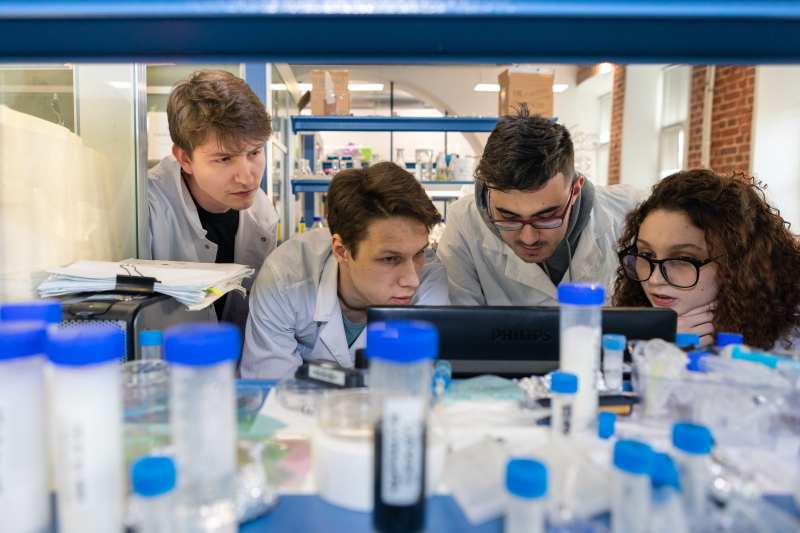
This year, over 360 students applied for the school, 45 of them made it through all the stages of selection, and 39 came to St. Petersburg to attend it. Applicants from different universities formed teams and chose a project to work on during the school. Among the options were: creating an eco-friendly dissolvent or hybrid materials made from spider web, developing a program for genomic bioinformatics, learning how to do 3D printing, studying the genome of a species, or working on tasks related to oncology. All projects were supported by the school’s sponsors – Merck, Fazer, UMight, Dia-M, and Komus.
“We decided to hold the school offline because in-person communication is one of its crucial aspects. During the week, our students spent a lot of time working with equipment, contributed to team projects, and visited joint lectures, for example, on AI in nanotechnologies or personal brands in science. This year, we offered a couple of new options for project activities, such as creating a nanotoothpaste and studying “smuggler” bacteria, and also added an extra day for team building and playing games so that the participants would be able to hang out with all their fellow students, not only their teammates, and learn more about other projects of the school,” says Polina Khapaeva, director for development at the ChemBio cluster.



ITMO.NEWS asked the participants to discuss their impressions of the school and the projects they worked on.
Albina Murashko
Third-year student at the Faculty of Materials Science, Lomonosov Moscow State University
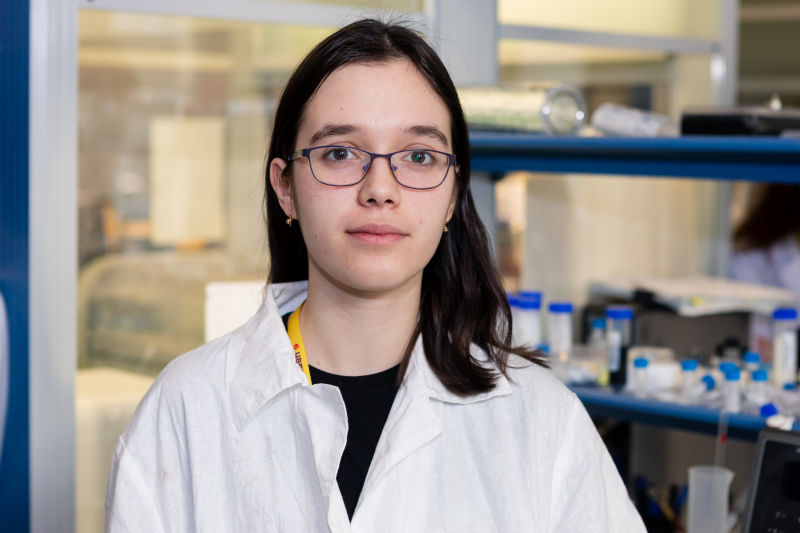
At my university, I’m engaged in biomaterials and I work at a laboratory that produces implants for the replacement of damaged fragments of bone tissue. At the workshop, I wanted to gain experience of working at another lab, talk to scientists, and learn how SCAMT works because it’s very popular these days. I also wanted to see how 3D printing is applied here.
During the school, Alisa Menshchikova and I developed materials that will help protect all kinds of products from forgery. The tricky part is – these materials must be suitable for all shapes and structures, so we used 3D printing. Another benefit of our material is biocompatibility (which allows it to be used in the food industry) and photoluminescence provided by carbon dots. To check an object’s authenticity, all you need to do is to point a UV flashlight on it and you’ll see a blue or a red mark.
Nikita Fisenko
Fourth-year student at the Higher Chemical College of the Russian Academy of Sciences, Mendeleev University of Chemical Technology of Russia
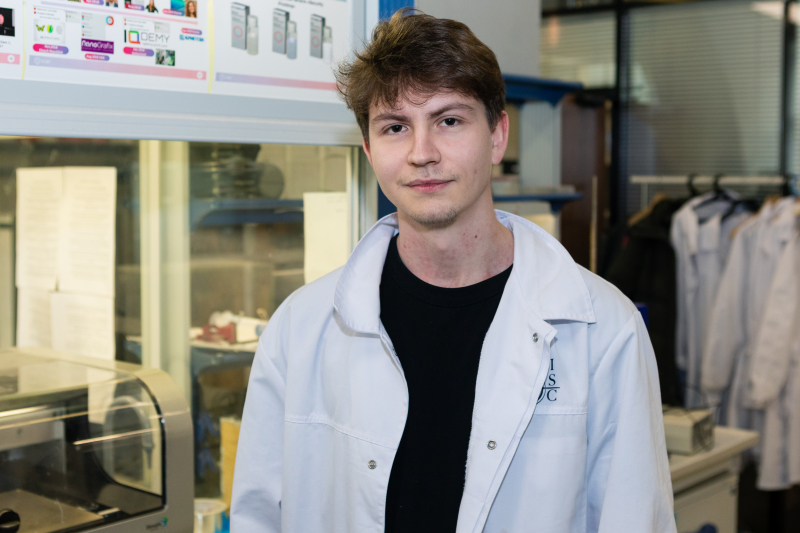
I’m into materials studies and inorganic chemistry in general: I’m working with the sol-gel method and additive technologies, e.g., the layer-by-layer coverage of surfaces using various printing methods, including inkjet. A friend of mine who works at SCAMT told me about the workshop week and I decided to apply. Here, I learned a lot of fascinating information on new ways to apply inkjet printing, new research methods, personal branding in science, and the creation of labs from scratch.
During the workshop week, I also did inkjet printing. Together with Maria Egorova and Alexander Djumaev, we created an interfering image and covered it with a luminescent layer using two types of ink – organic (such as acrylate monomers) and inorganic (based on perovskites). We plan to apply the achieved results for the protection of banknotes, documents, and ID cards: our project is easy to implement and is as efficient as conventional methods of protection, which, in their turn, require more resources. Inkjet printing can also be used for the creation of new devices such as resonators, semiconductors, and waveguides, as it allows us to cover all kinds of pads and surfaces.
Yaroslav Kutuzov
Second-year student at the Institute of Chemistry, St. Petersburg State University
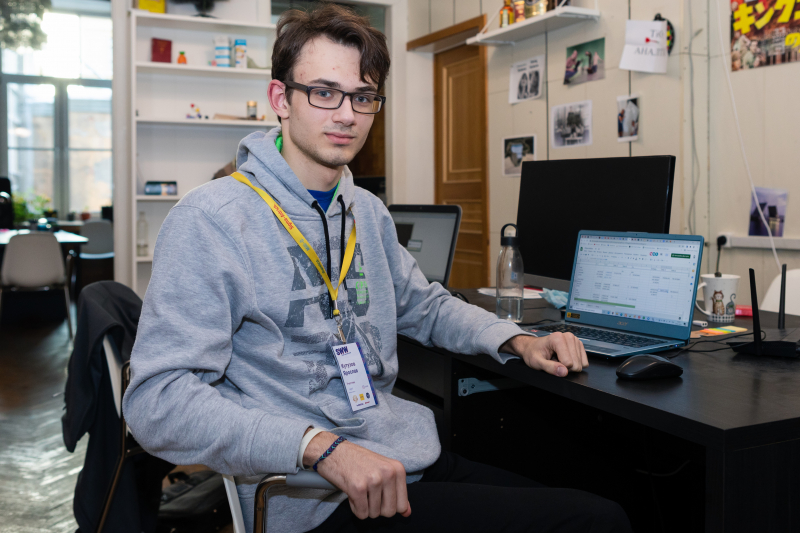
This isn’t my first time at SCAMT: as a tenth grade student, I did a career-guidance internship here, and in the eleventh grade, I worked here. As part of a research team at my home university, I work on organic synthesis and unsaturated compounds – alkynes, cycloalkynes, and the corresponding reactions. During the Workshop Week, I decided to try my hand in a field that is new to me – computational chemistry. Alexander Dubok and I researched how we can model the power of organic acids in various dissolvents using relatively simple methods. Let’s say, a dangerous dissolvent is used at a facility and it should be replaced with an eco-friendly one. In order to do that, we need to know how the reaction between its compounds takes place. One of the tasks is to assess the acidity of functional groups, so we want to develop a model that would allow us to choose a suitable dissolvent for chemical processes in the industry even if there’s not enough data and without the need to conduct lots of routine experiments. Our approach is supposed to make a researcher’s work easier and requires as little experimental data as possible.
Vladimir Gaidukov
Third-year student at the Biological Faculty, Belarusian State University
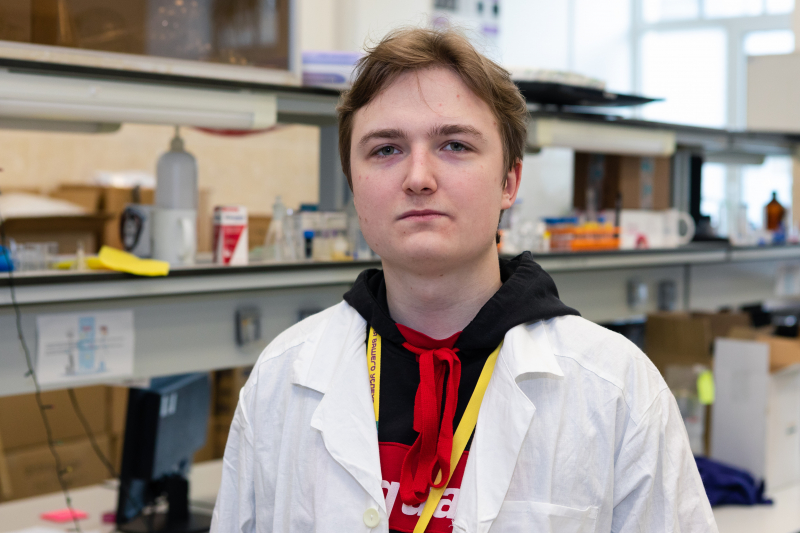
Lecturers from my university and friends who have already participated in the SCAMT Workshop Week suggested that I apply for this school. Plus, I wanted to gain more experience, expand my academic network, and learn how to work with an electronic microscope and spectroscope. Overall, I applied to broaden my horizons and learn more about the science of the future.
At my university, I work on a project related to exosomes of stem cells that help cure neurodegenerative diseases. During the school, however, I was engaged in another task: together with Petr Kalashnikov and Daria Advakhova, I created hybrid materials based on the spider web. At first, we had to obtain the web from an insectarium, then clean and modify it to enrich it with the required properties. We would like to use it as a material for a special bondage to place on damaged nerves. Attached to the web are magnetic particles with lipid balls containing medicine and, under the influence of a magnet, these particles will heat up, the balls will dissolve and in this way, delivered the medicine to the nerves.
Alina Levushkina
Fourth-year student at the Faculty of Biotechnology, National Research Nuclear University MEPhI
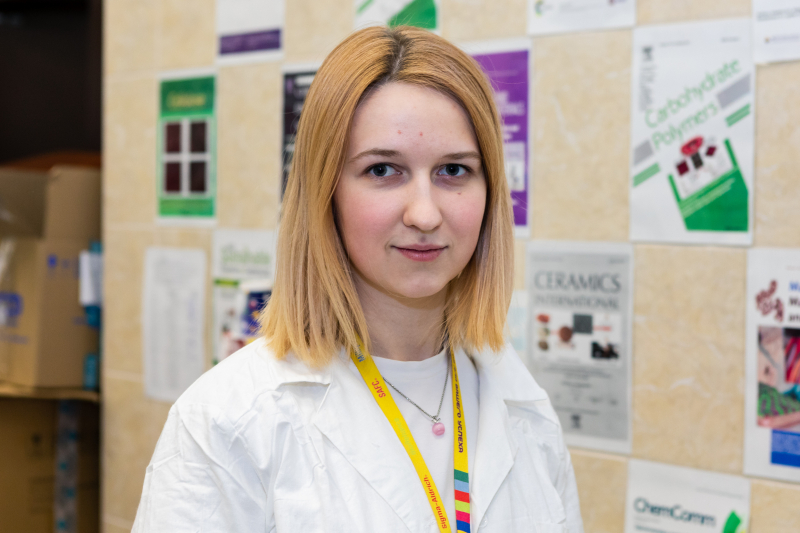
Though I’m currently writing a thesis about various surface modifications of silicon nanoparticles for targeted drug delivery, I also have an interest in nanopharmaceutics and medical chemistry.
I’ve wanted to take part in SCAMT Workshop Week for a long time. I was curious about what the lab does and I’ve been eager to join it and implement my ideas since I was a first-year student. There were four people in our team: me, Anastasia Ignatskaya, Nikolai Atorin, and Valentina Bocharova. We worked together to create a formula for a new toothpaste that would contain special ingredients efficient at maintaining oral health. Thanks to the school, I now know how to be a great team player and make interesting and easy-to-follow presentations.
Maria Eremeeva
Fourth-year student at the Institute of Chemistry, St. Petersburg State University
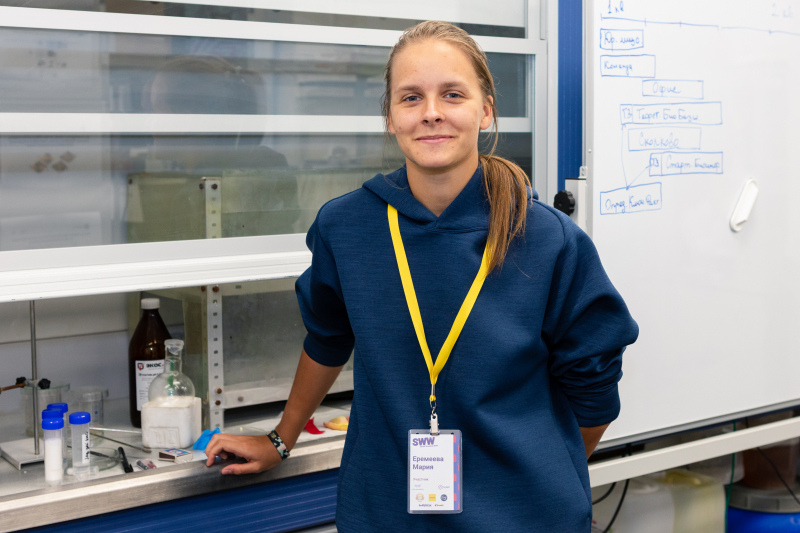
I’m investigating the organic synthesis of bioactive compounds at the Chemical Pharmacology Laboratory. I applied to the school because it offered projects similar to my field of study, namely chemistry and biology. But in the end, I chose to try my hand at the startup in a week project. I’ve always wondered how technologies developed in research labs reach the market and how to find investors and potential customers. Besides, I wanted to see the results of my work as soon as possible.
Together with Elizabeth Miguel and Anna Skotnikova, we developed a concept of a test kit that can help people detect tooth decay without going to a dentist. Many kids hate brushing their teeth and are afraid of dentists. Using this test kit, children and their parents will not only be able to detect cavities but also learn that the main cause of dental problems is sugar. Here’s how it would work: you make a dental cast of your kid’s teeth using safe-to-use materials. Then, this cast is filled with a special gypsum solution containing a dye that reacts to fermenting sugar. A change in color on some part of the cast indicates tooth decay. When a certain part of the cast changes its color, it means that this area is affected by caries. I think that’s awesome that we managed to do such a great job in a limited time and with few reagents on our hands.
Nikita Vaulin
Fourth-year student at the Institute of Physics and Mechanics, Peter the Great St. Petersburg Polytechnic University
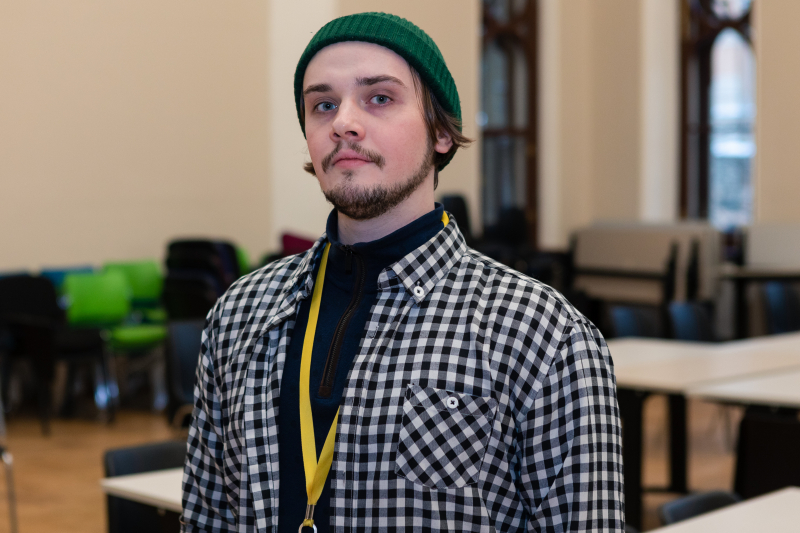
My current project is about the proteins associated with CRISPR-Cas bacterial immunity systems. These systems can be used to cut and destroy a certain gene affected by a mutation and then repair the associated damage. When I joined the school, I decided to step away from wet labs to dive deeper into programming. ITMO, one of the best IT universities, and the school gave me a chance to take my first steps into the world of software development.
During the workshop, my colleagues (Valeria Suchok, Svetlana Vasilyeva, Anastasia Gritseva, and Ekaterina Markova) and I studied lizards that when crossed with other lizards produce parthenogenetic offspring. We analyzed the sequenced genome of lizards to figure out what caused the transition from sexual to asexual reproduction. Hopefully, our research will make the process of parthenogenesis more transparent and find practical use in the future.
Polina Pavlova
Third-year student at the Faculty of Biology, Kuban State University
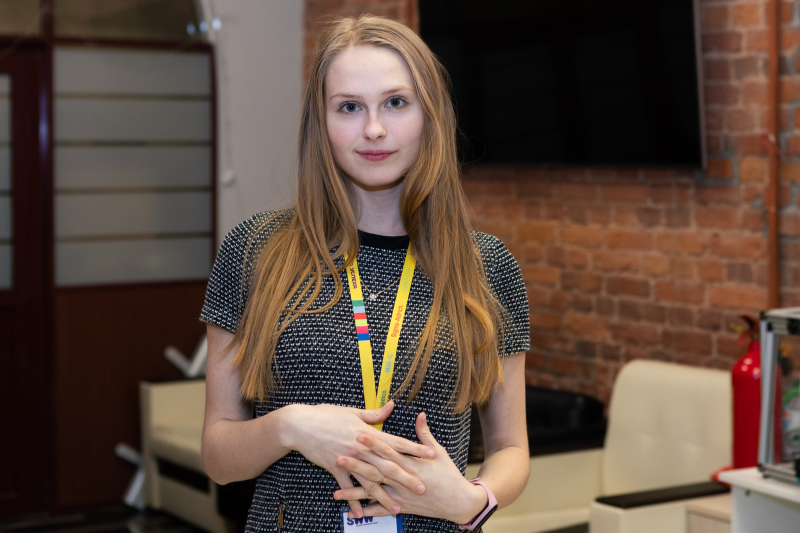
I’m studying microbial fuel cells and developing a special drone that can analyze the state of the environment based on bacterial electrogenesis. In this process, bacteria consume non-environmental substances in water and thereby produce electricity. Knowing that, we will be able to say where the most polluted waters are and how much pollutants they contain.
During the workshop week, we were working on an ecobattery, which generates electricity from microorganisms that absorbs harmful substances. The goal was to produce a microbial fuel cell powerful enough to charge a phone. I enjoyed SCAMT Workshop Week. There, I had the chance to overcome stress and improve my communication skills by talking to people from various universities, as well as practice public speaking at pitch sessions.
Egor Ukladov
Fourth-year student at the Faculty of Natural Science, Novosibirsk State University
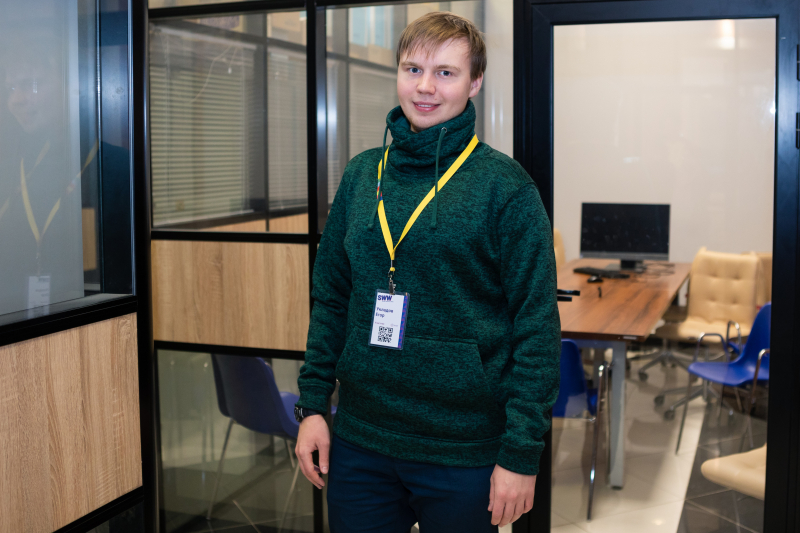
I’m exploring a DNA repair system, which is particularly active in cancer cells. In case our method for measuring the activity of the system proves efficient, we may be able to predict how well chemotherapy will work before the actual treatment.
During the workshop week, I worked with Anna Dergileva, Danilya Gabudinova, Arina Bogomazova, Alexey Shefer, and Lyubov Kuznetsova. Together, we worked on a cancer research model. To build such a model, we grew cells of colorectal cancer and then treated them with various chemical modifications of the known chemotherapy drugs to find out which structures of the drug are responsible for the toxic effect. And the reason why that’s important is that the initial compound is not ideal, meaning that it can kill not only the bad cancer cells but also the good healthy cells. Our project will help us understand which parts of the drug need to be further improved so that the drug would become more efficient in the fight against cancer, yet less harmful to the human body.
I learned about the SCAMT Workshop Week from my friend who participated in the school and another friend who studies at ITMO. I decided to apply because I wanted to learn what science is like outside Novosibirsk. It was extremely helpful to attend lectures on microscopy and cytofluorometry, as well as get to know how to become a better speaker and present my projects more efficiently.
(источник https://news.itmo.ru/en/education/students/news/12417/)